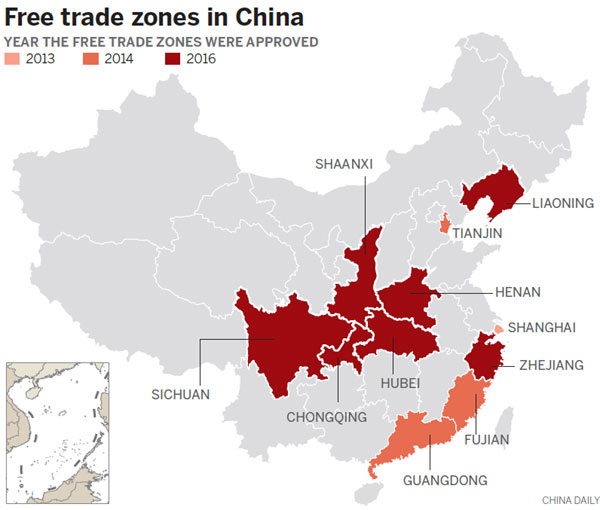The next big thing

New free trade zones are at the vanguard of changes in nation's development strategy
Yang Shuo wants to be an entrepreneur who leads China's economic future.
The 25-year-old owner of Bo Shi Wen Chang, an artists-material business, was among hundreds wanting to register their businesses in the Governmental Affairs Center of the Shenyang Area of the China (Liaoning) Pilot Free Trade Zone.
"We have a five-year plan to be one of the top artists-material companies in China," he says.
Whether he realizes his ambition for the business he started with just 100,000 yuan ($14,874; 12,500 euros; £11,225), and which currently employs only five people, remains to be seen.
However, Yang, is one of those attracted by the Chinese government's initiative to launch seven new free trade zones across China.
Apart from the one in Liaoning province in Northeast China, the others are in Zhejiang province in eastern China; Henan and Hubei in central China; and Sichuan and Shaanxi provinces and Chongqing municipality in the west.
They bring the total of FTZs in China to 11, with the first in Shanghai, designed to open up China's capital market and increase the liberalization of the Chinese yuan, launched in 2013. The other three - established in 2015 - are in Tianjin, Guangdong and Fujian provinces.
The new zones are designed to be at the vanguard of China's efforts to upgrade its industry and meet the objectives of the Made in China 2025 manufacturing strategy.
They also are aimed at opening up certain areas of the country, particularly central and western China, to foreign investment in line with the aims of China's Belt and Road Initiative.
In Shenyang, as of July 31, 8,131 Chinese and 53 foreign-invested enterprises had already registered in the zone. The Chinese companies have registered capital of 61.87 billion yuan, and the foreign-invested ones $436 million.
Shenyang is one of the three areas of the Liaoning zone, which also includes Dalian and Yingkou. From page 1 The registration center is a hive of activity, with many of those registering businesses seemingly in their 20s.
Yang Fan, a coordinator at the service center, says many young people in Liaoning are attracted to the idea of setting up a business.
"The people who come here are of all age ranges, but a lot of young people leaving college now want to set up their own business. Many don't want to go into a conventional job. They want to do something that interests them," she says.
The parents of some of those registering businesses would have been content to work, often for their whole careers, in one of the State-owned heavy industry enterprises that dominated the province.
Many of these companies are now shedding labor as the economy of the region is being forced to restructure.
Bright, clean and modern, and with around 60 employees in smart uniforms, the service center is almost the embodiment of a more modern China.
Yang says the aim is to get away from some of the bureaucratic culture that might exist outside of the zone.
"The important thing here is to have a 'can do' culture. If the staff don't know something, they will find out. We find answers for people. We don't say no or any other negative word when we are dealing with people."
Yang Shuo, who studied art design at Shenyang Urban Construction University and whose company makes pens for which it subcontracts the manufacturing, says he was impressed with the ease of registration.
"My business is now registered within the zone, although not physically located there. It enables me to take advantage of some of the favorable policies, which include tax advantages and less regulation."
China has seen such zones as central to its economic development since Deng Xiaoping's reform and opening-up in the late 1970s.
The special economic zones along its southern and eastern seaboard - most notably that in Shenzhen, which started out as a fishing village - effectively kick-started China's march toward becoming the manufacturing workshop of the world.
The new generation of development zones - starting with the much-heralded Shanghai one in 2013 - are intended to propel China to its next phase of development.
Shanghai itself has come into some criticism for not being quite the laboratory for financial reform it was originally intended to be.
Businesses within the zone, however, have more freedom to make foreign currency exchange transactions and capital account settlements than in the rest of China.
The zone has also been operating at a time when there was pressure on the Chinese currency after a reform of the exchange rate mechanism in August 2015, which has since seen an imposition of stricter capital controls across the whole country.
Wu Jiangang, research fellow at the Lujiazhu International Finance Research Center at CEIBS in Shanghai, believes some of the criticism is unfair.
"Perhaps the steps are not so big, but steps have been taken; there has been some good practice and it has so far been a worthwhile experiment," he says.
"We cannot just open the capital account, particularly when there have been pressures on the yuan over the past two years."
Edward Tse, founder and CEO of management consultants Gao Feng Advisory, believes the government is right to continue with the model and roll out new FTZs this year.
"The Chinese government has done this really well over the past few decades. They have experimented with policy by launching these pilots, and it has been a model for Chinese development. It is a smart idea, and I think it is a good philosophy."
Wu at CEIBS believes FTZs provide a solution for China because it would be difficult to experiment with policy on a national level.
"China is a very big country and therefore it is more difficult to reform. It is also not like the United States, where every state has its own laws. China's provinces operate under national laws and regulations," he says.
"The FTZs give China the opportunity to develop innovative policies and see if they work in practice."
Falk Lichtenstein, a Beijing-based partner at international law firm CMS, says the FTZs could be viewed as a response to the China government putting an end to local preferential policies in 2008.
"Until then many local governments tried to attract foreign investment with local preferential tax policies and other kinds of special features which were not fully in line with the national law. The foreign investment guideline catalog applied all over the country. And then in 2013, somewhat to our surprise, the Chinese government started these preferential policies again with the Shanghai FTZ."
Huang Meibo, director of the Institute for International Development at Xiamen University, believes such zones offer lessons for other developing countries, particularly those in Africa.
"China has set up these zones and attracted foreign companies to invest. I think it is one way to foster development; it is difficult to say whether it is the best."
Back at the headquarters of the Shenyang Area of the China (Liaoning) Pilot Free Trade Zone, Zhang Shicheng is gearing up for an influx of companies and investment into the zone.
He is director of laws and policy and is responsible for making sure all the regulations are implemented efficiently.
"It is not that the rules and regulations outside the zone are wrong or not working. We just want to adapt them so they fit better with international regulations," he says.
"Because a lot of international regulation is new to us, we need to understand it more to fit in with the existing mechanisms of our laws."
Zhang says it is still important for the zone to protect domestic industries hence it will have the same negative list as Shanghai in banning foreign investment in certain sectors.
"The Shanghai negative list is a national level list, but we are making every effort to shorten it. This means that foreign investment in a wide variety of areas will become much easier over time."
Zhang says one of his main aims is to ensure the zone is an easy place for everyone to do business, whether they are Chinese companies or foreign-owned ones.
"We make sure the staff are well trained before they take up their positions. They need to develop different ways of thinking and behavior to adapt themselves to the free trade zone style," he says.
"The service we want to offer is to make the approval process efficient and convenient and save time and costs for people who come here. The fee for the approval process here is actually zero."
On Harbin Street in Shenyang's Shenhe district, Munuo Ecology is one local business that wants to take advantage of the free trade zone on its doorstep.
The company was founded only two years ago by now 35-year-old Wang Shengjun, who has tapped into the market of an ever-increasing number of middle class consumers wanting healthy agricultural products.
He currently sources agricultural products from a network of around 20 suppliers.
The FTZ provides the company with the opportunity to conduct international trade for the first time, and so it has registered a subsidiary.
It plans to import seafood through the port of Yingko, which is part of the Liaoning FTZ, and also sell its own domestic produce.
'The launch of the zone actually give us a window to this. It has given us a window to contact with the outside world," he says.
Before the FTZ came into operation, his only option for importing seafood was through it being airlifted into Beijing or through the Liaoning port of Dandong. Customs clearance will be facilitated much more easily within the FTZ and the costs will also be much reduced.
Wang, who graduated from the Agricultural University of Shenyang in 2008, believes the FTZ will create demand internationally for locally-grown produce.
"The northeast region of China is famous for its rich black soil, and we have very good agricultural produce, better than in the south of the country," he says.
"I want to promote the agricultural produce of my home region around the world, and this is one of the reasons why I started the company."
Fantian Industrial Design is a business that the new FTZ would like to encourage to develop.
It started out as an advertising company but moved into manufacturing design in 2007. It has since won 12 Red Star Design Awards, the prestigious Chinese design awards.
Its designs include the robotin, which is a robot the size of an average 7-to 11-year-old that can act as a guide at exhibitions.
Lin Chunwei, the company's 46-year-old chief executive officer, is mulling whether to relocate the company, which employs more than 60, into the zone.
"It is something we are considering. Our company is still growing and we wouldn't let go any chance to grow if it had a chance of boosting the development of the company. We are looking at what sort of supportive policies will be introduced."
Lin, however, is not convinced that establishing an FTZ is necessarily the right way to help restructure the economy of Northeast China and move it away from heavy engineering toward more advanced manufacturing.
"I think creating a better environment for businesses to operate in generally might do more for the northeast's economy. We would like to see a business environment where there are fewer limitations, regulations and rules, especially for private companies, so they can develop more freely and be more creative."
Zhang Shu, 36 and the company's brand director, says that if the FTZ is to focus on robotics, it should build on the region's existing industrial strength.
"I certainly hope that Shenyang could be a center for the robotic industry in the future, but there are many types of robots and I think Liaoning as an industrial area should focus on industrial robots and leave the humanlike service robots to places like Shanghai, whose strength is in the service sector."
For now, however, the FTZ is going to be a boost to service sector businesses in Shenyang as the city receives an influx of people to work in the zone - many from abroad.
Syntio Camilleri, the 53-year-old Maltese general manager of Wanda Vista Shenyang, one of four Wanda hotel properties in Liaoning, is gearing up for extra business.
His hotel on Yingpan West Street is the closest to the FTZ.
"We are very optimistic about the launch of the new FTZ, which will bring in more companies to the region, and hence there will be a multiplier effect that hotels will benefit from."
He says two large branded hotels will open near his hotel this year, and three smaller ones are in the pipeline.
"We expect a mix of shirt and long-term stays. We already have a good number of BMW guests (the German car company has a major base in the city), and many of them stay for more than six months at a time."
So far, the FTZs have been an indication of the future direction of policy. There has been a reduction of the number of sectors on the so-called negative list, and there has been a subsequent similar reduction of sectors in which foreign companies can operate nationally.
Lichtenstein at law firm CMS says there are risks in this for the FTZ's policymakers.
"Foreign companies were allowed to do motorcycle manufacturing in 2014 in the Shanghai FTZ, but within less than 24 months, they were then allowed to set up anywhere in China and somewhere that may suit them better logistically. In the future, they may just look at the policy regulation operating in the zones and expect there to be a similar change in national policy a few years later."
The Chinese government gave another nod to future policy direction when, at the end of last year, it allowed foreign arbitration under the jurisdiction of such courts as the London Court of Arbitration and the International Court of Arbitration in Paris within the FTZs to resolve disputes between foreign and Chinese companies. Many would see this as a major reform.
Wu at CEIBS says the FTZs should be seen in context.
"They will not be the only factor driving development in China and will certainly not be the most important, but they definitely have a role to play."
Contact the writer at andrewmoody@chinadaily.com.cn and zhentongtong@chinadaily.com.cn
Cai Shiyu also contributed to this story.









